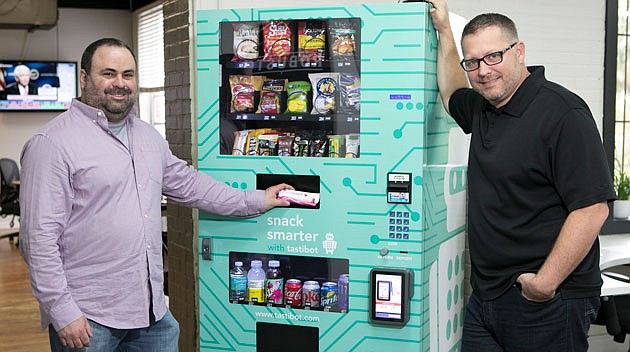- November 23, 2024
-
-
Loading

Loading

This isn't your college dorm vending machine.
Far from it. What former Verizon manager Jeffrey Dovedot and entrepreneur and commercial real estate investor Scott Dobbins say they've created with Tampa-based Tastibot is a new way to eat healthy on the go. “We don't even like to use the word vending machine,” says Dobbins. “We call this automatic merchandising.”
The pair hopes potential clients call it the next best thing in snacking. Tastibot machines — tasti is for products, bot is for technology — are slightly narrower than standard vending machines, in light green with a robot logo. The top three levels are snacks, the bottom level is an array of cold drinks. Payment options include Android and Apple Pay, debit cards and four major credit cards, and cash.
The Tastibot business model is to provide the machines for free, do all the maintenance and trouble-shooting, then collect revenues from products sold. “We are in the business of making the coils move,” says Dobbins.
So it's vital to maintain a high-volume, high-transaction pace. For locations for Tastibot machines, the company targets Class A offices, apartment buildings and manufacturing or other large facilities — places with at least 100 people five days a week. CoWork Tampa has a machine, placed there last summer.
After spending most of 2016 doing research, Tastibot rolled out 20 machines in the Tampa area last year. It hopes to triple that figure in 2018. At 60 machines, Dobbins, 43, and Dovedot, 47, believe they will have enough data on usage, product mix and technology to expand in the right places in Florida and regionally. The pair has invested more than $100,000 from personal savings in the business, says Dobbins, and the average unit gross and net revenue volumes on the machines so far exceed industry standards.
“We definitely thought the vending business was a bit of a legacy business,” says Dobbins. “We thought it was prime for disruption.”
The Tastibot disruptive advantage, says Dovedot, comes from three spots: the product mix, where snacks and drinks in some machines include kombucha and Hippeas organic chips; the technology, which includes the multiple payment methods and remote real-time inventory software; and a customer service model where issues go directly to Tastibot — not an overworked office administrator where the machine sits. The payment options, handled through a 7-inch rugged tablet hooked to the machine, adds Dovedot, “opens up a new slate of people who can buy these products.”
The product mix, meanwhile, is a fit for foodies, say the executives. There are Kind Bars and Fig Bars, in addition to Stacy's Chips and Sun Chips. Drinks in some machines include V8 and Vitaminwater. None of the options has more than 20 grams of sugar, and there are low-carb, vegan and non-GMO choices. (Tasti doesn't mean all healthy, all the time. Some machines include Peanut M&Ms and cans of Coke.)
Dobbins says the company spent a year curating and analyzing everything from taste and texture to the right ingredients and right value to price to balancing salty with sweet. “I don't know of any company that has gone to the lengths we have for product mix,” says Dobbins. “We have a diverse flavor portfolio in the machine.”
Dobbins and Dovedot met in 2016 through mutual friends. Dobbins, who played college football with former Tampa Bay Buccaneers star Mike Alstott, and later did some real estate deals with him, sought an investment opportunity outside commercial properties. In looking for a second career after Verizon, Dovedot wanted something entrepreneurial.
The pair says the Tastiboit model can spread beyond offices. One idea is to change the product mix to toiletries, such as razor blades and toothbrushes, and put the machines in hotels. Others have inquired about licensing Tastibot machines.
The company plans to move ahead deliberately. “There are plenty of opportunities to expand,” Dobbins says. “But we want to be local experts on this first. We want to stay in our lane.”